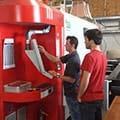A Case of Attitude
The young metal fab shop employee approached the older worker in the break room. “Could I talk to you over lunch?” he asked.
“Sure,” the old fabricator replied. “What’s on your mind?”
“Well, I’ve yelled at other employees a couple of times, and the boss said he’d have to write me up if it keeps happening,” the young man confessed. “He said I have a ‘case of attitude,’ and suggested that I might want to talk to you because you are ‘stoic’ and maybe I could learn about that from you.”
“Do you know what the adjective stoic means?” asked the fabricator.
“Well, my family talks about my great-grandfather and some of the hard things he had to go through in his life, and I’ve heard them say that he was stoic and never complained, so I think it means that you turn off your emotions.”
The old fabricator laughed and said, “No, it doesn’t mean that. Stoicism is an ancient Greek philosophy developed around 2300 years ago. Someone who follows that philosophy is called by the proper noun Stoic, and they understand that they don’t control the world around them, but they can control how they respond to it.”
A Lesson in Serenity
The young man asked, “So does that mean that you don’t get mad?”
“I get mad,” the fabricator admitted, “but I try to control myself so that I don’t react badly when that happens.”
“How does that work?” the younger employee asked.
“When I was about your age,” the old fabricator replied after a moment, “I went with my friend to one of the meetings he attended as a recovering alcoholic. It was there that I heard the most remarkable thing. Someone recited a verse they called The Serenity Prayer, which I later memorized. It goes like this:
“God, grant me the serenity
to accept the things I cannot change,
the courage to change the things I can,
and the wisdom to know the difference.”
“Serenity?” the shop worker asked. “I’ve heard that word, but I’m not sure I know what it means.”
“Serenity is a state of peacefulness, an absence of mental stress,” the fabricator explained. “The idea of the saying is that you choose to be calm and accept things that you have no control over, while being brave enough to fix those things that you can change.
“The Serenity Prayer was composed by the theologian Reinhold Niebuhr around a century ago, but it was based on ideas that go back thousands of years to the Stoic philosophers themselves.”
The fabricator took his phone out of his pocket. “I used to keep a notebook with quotes from the Stoic philosophers and others, but I transferred it to my phone so I could review them when I felt the need.” Scrolling through some text on an app, he continued, “Here is something that the philosopher Epictetus who lived in the first century wrote: ‘It’s not what happens to you, but how you react to it that matters.’ He understood that you could choose your response to things that are out of your control.
“Here’s another quote from him: ‘Make the best use of what is in your power and take the rest as it happens. Some things are up to us, and some things are not up to us.’ He taught that things like our reputation or possessions or even our own bodies are not necessarily within our control, but our thoughts and emotions are things that we can decide.”
Scrolling some more, the fabricator continued. “My favorite Stoic philosopher was Marcus Aurelius, who was the emperor of Rome near the end of the second century. In his youth he studied philosophy, especially the discourses of Epictetus. When he became emperor, he kept a journal where he wrote daily thoughts or ‘meditations’ based on Stoic philosophy to help him stay grounded and make sense of the universe through the wars that were going on. It was also so he could rule his people with compassion, a rare trait among emperors.
“Some of the things he wrote include, ‘You have power over your mind—not outside events. Realize this, and you will find strength,’ and ‘Today I escaped anxiety. Or no, I discarded it, because it was within me, in my own perceptions— not outside.’ He understood that the choice of how he reacted to external things was within his control.”
The Road to Stoicism
“So, if I just learn how to react to things in the right way,” the young man asked, “then I will become a stoic person?”
“Nope,” the old fabricator responded with a smile, “but you will have a very good start. Stoicism as a philosophy involves more than just that, but if you master that one thing it will go a long way towards keeping you out of trouble here at work.
“The Stoics sought virtue and shunned vice. They broke virtue down into four principles: wisdom, courage, moderation, and justice. Vice, therefore, involves foolishness, cowardice, intemperance, and injustice. They taught that true happiness comes from embracing virtue.
“We don’t have time today to go through all the great Stoic philosophers and what they taught, but I challenge you to search online for Stoic quotes and write down the ones that make sense to you. Along the way, you’ll find ideas from great thinkers like Zeno of Citium, who founded Stoicism, Cleanthes, Seneca, and others. Try to live by the principles that you learn and review them often.
“Why don’t you start there and then check back with me in a week?”
The young man agreed and started studying that evening. One of the first quotes he came across was from Seneca: “Choose someone whose way of life as well as words, and whose very face as mirroring the character that lies behind it, have won your approval. Be always pointing him out to yourself either as your guardian or as your model. This is a need, in my view, for someone as a standard against which our characters can measure themselves. Without a ruler to do it against you won’t make the crooked straight.”
The young man smiled and nodded, thinking of his older coworker. He knew that the stoic fabricator was a good role model, and he pledged to follow his example and not allow outside forces to dictate how he would react to things in the future.







